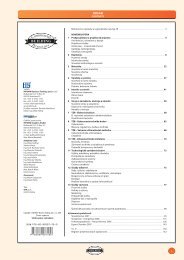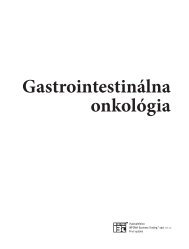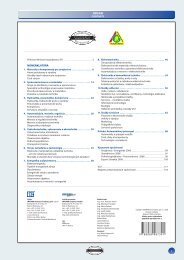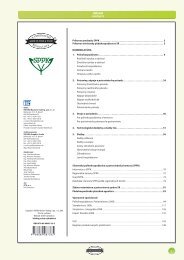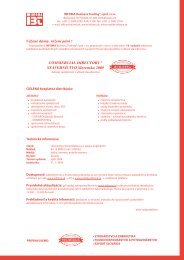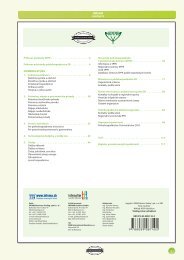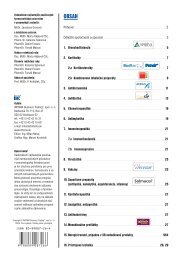OLD-SLAVONIC EMPIRE - INFOMA
OLD-SLAVONIC EMPIRE - INFOMA
OLD-SLAVONIC EMPIRE - INFOMA
You also want an ePaper? Increase the reach of your titles
YUMPU automatically turns print PDFs into web optimized ePapers that Google loves.
4<br />
Dear Readers,<br />
ADRESS BY THE MINISTER OF ECONOMY<br />
PRÍHOVOR MINISTRA HOSPODÁRSTVA<br />
Slovakia is an open and export-oriented<br />
country. Almost 90 per cent of our GDP is made<br />
up of export. This openness, which was an<br />
advantage at times of prosperity of the region,<br />
has manifested itself negatively in the period<br />
of the global crisis. Since Slovakia is highly<br />
dependent on the development of the external<br />
environment, we are particular in contributing<br />
to the renewal of growth in the entire region by<br />
means of appropriate measures. The measures<br />
approved by the Government of the Slovak<br />
Republic, aimed at mitigating the consequences<br />
of the global crisis, therefore have an impact on<br />
the economies of other countries, too. We make<br />
endeavours to compensate the deficit of private<br />
investments and consumption by means of<br />
a broader private investments programme<br />
focused mainly on infrastructure construction<br />
and renewal. We are introducing programmes<br />
for the promotion of industry and reduction of<br />
energy intensity.<br />
A favourable business environment is the<br />
prerequisite for long-term competition and<br />
growth of every market economy. The decisions<br />
and actions taken by the public administration<br />
in the past years have largely contributed to<br />
improving the business environment in the<br />
Slovak Republic. In this regard, our country has<br />
even become an example to be followed for<br />
other countries and is one of those where most<br />
of the reforms have been made. Yet, there are<br />
always many things to improve. Businessmen in<br />
Slovakia still complain about the administrative<br />
obstacles. Slovakia has recently joined the<br />
activities of the European Union, which is<br />
trying to reduce the administrative burdens<br />
in business by 25 per cent by the year 2012<br />
by means of an action programme and with<br />
the help of the EU Member States. In October<br />
2007, the Government of the Slovak Republic<br />
approved the “Action Programme for Reducing<br />
Administrative Burdens in Slovakia 2007-2012”,<br />
by which it entered in this EU commitment. The<br />
project is divided into three stages. Currently,<br />
we are entering the last stage. We prepared<br />
the instruments and defined the conditions for<br />
measuring the administrative burdens in Slovakia<br />
at the first stage. Within the second stage, we<br />
quantified the administrative burdens in the<br />
Slovak Republic. The implementation team, in<br />
cooperation with the representatives of other<br />
sectors, evaluated the 48 most relevant legal<br />
regulations. They mainly focused on commercial<br />
and civil law, the accounting of bankruptcy and<br />
restructuring, market regulation and investment<br />
incentives regulation. We also examined the<br />
legal regulations concerning taxes, customs,<br />
fees and insurance payments, as well as labour,<br />
employment, intellectual property and the<br />
environment. This selection was based on the<br />
recommendations of the state administration<br />
bodies, and the representatives of the business<br />
sectors were invited, too. Their opinions and<br />
suggestions became the basis of the whole<br />
project. It has several fundamental objectives.<br />
The first one is to define the actual cost rate and<br />
administrative burdens of entrepreneurs, which<br />
relates to the fulfilment of reporting obligations<br />
arising from the Slovak laws. The next step<br />
was the adoption of appropriate measures to<br />
decrease the costs for entrepreneurs in this field<br />
and reduce their “paperwork” to an acceptable<br />
level. Slovakia is now entering the third stage.<br />
One of the first measures is that the entities and<br />
persons submitting draft bills will be obligated<br />
to assess the impacts of the bill on various fields<br />
and on the business environment in accordance<br />
with the single methodology approved. This<br />
will help to eliminate any actions resulting in<br />
increased administrative burden and costs for<br />
the business already at the stage of drafting<br />
bills.<br />
As for measures focused on mitigating the<br />
impacts of the crisis, the non-taxable part of the<br />
personal income tax base increased in Slovakia.<br />
The other measures include increasing of the<br />
employment bonus, change in the market<br />
entry price of tangible and intangible assets<br />
in relation to income taxes, reducing of the<br />
period for returning excessive VAT payments, as<br />
well as other positive changes in the business<br />
environment. As for entrepreneurs in need of<br />
access to available resources, the increase in the<br />
registered capital of Eximbanka (Export-Import<br />
Bank) and Slovenská záručná a rozvojová banka<br />
(Slovak Guarantee and Development Bank) is<br />
important.<br />
On the proposal of the Ministry of Economy,<br />
the Government of the Slovak Republic<br />
approved transparent and effective rules for<br />
granting state aid, which are favourable to<br />
investors. These strictly respect the rules and<br />
norms of the European Union. In response to<br />
the crisis, these conditions were operatively<br />
adjusted under the “package of anti-crisis<br />
measures”, prepared and adopted by general<br />
consensus by the Economic Crisis Council.<br />
We are implementing measures based on<br />
the principles of the single market, economic<br />
competition, and the rights and needs of<br />
citizens. In the framework of its anti-crisis<br />
policy, the government adopted 62 measures<br />
aimed at raising the aggregate demand and<br />
hence reviving consumption and production.<br />
These measures also include faster structural<br />
funds drawing, and implementation of large<br />
investment plans, including PPP projects. We<br />
are introducing programmes for the promotion



